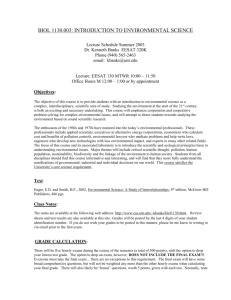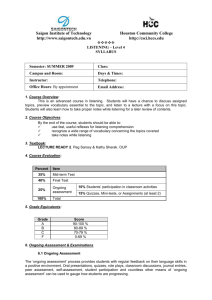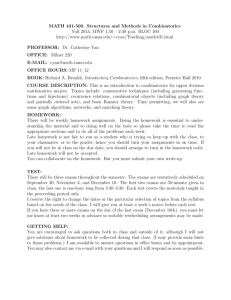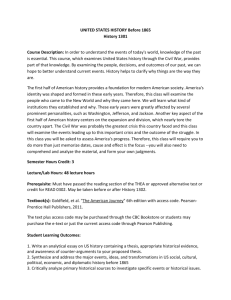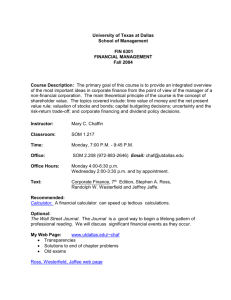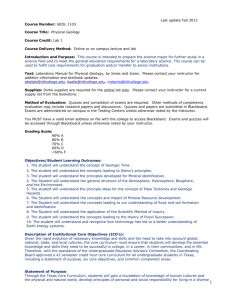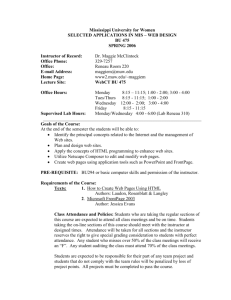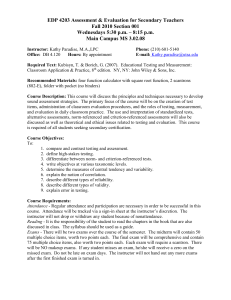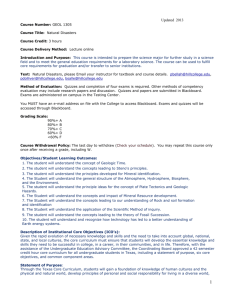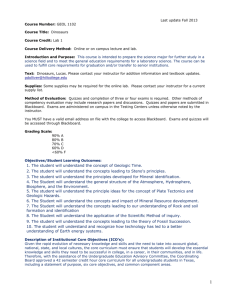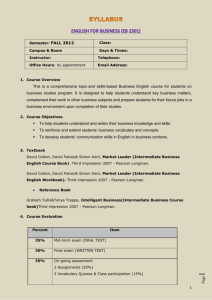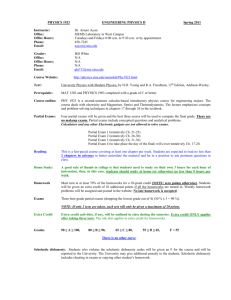BIOL 1130 - University of North Texas
advertisement
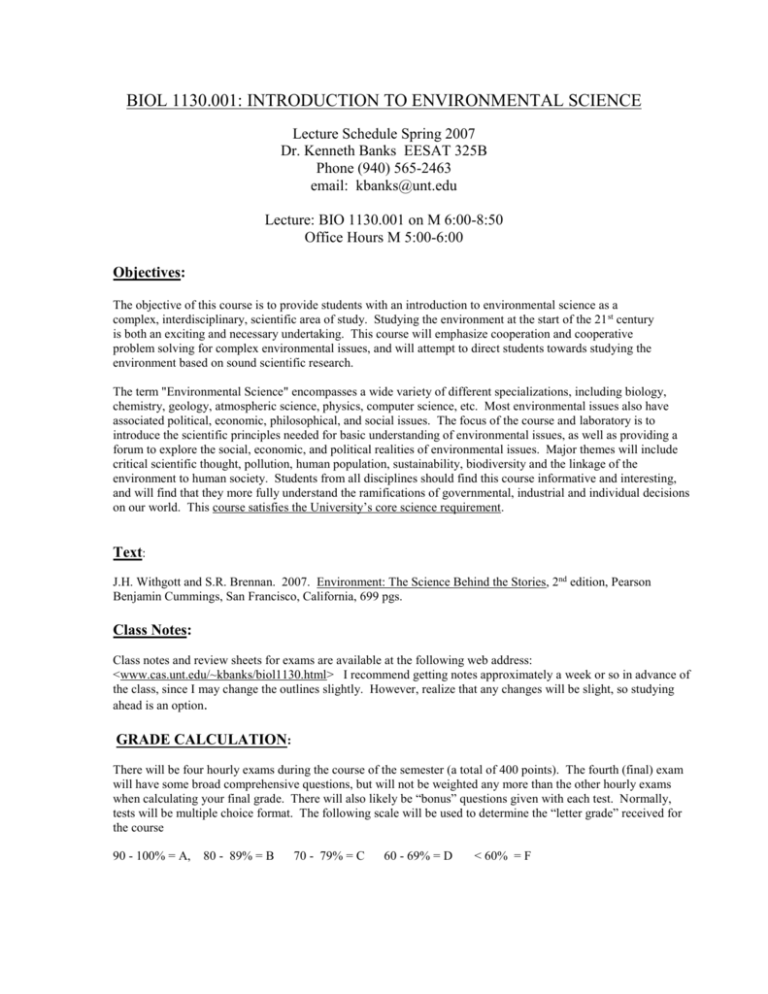
BIOL 1130.001: INTRODUCTION TO ENVIRONMENTAL SCIENCE Lecture Schedule Spring 2007 Dr. Kenneth Banks EESAT 325B Phone (940) 565-2463 email: kbanks@unt.edu Lecture: BIO 1130.001 on M 6:00-8:50 Office Hours M 5:00-6:00 Objectives: The objective of this course is to provide students with an introduction to environmental science as a complex, interdisciplinary, scientific area of study. Studying the environment at the start of the 21 st century is both an exciting and necessary undertaking. This course will emphasize cooperation and cooperative problem solving for complex environmental issues, and will attempt to direct students towards studying the environment based on sound scientific research. The term "Environmental Science" encompasses a wide variety of different specializations, including biology, chemistry, geology, atmospheric science, physics, computer science, etc. Most environmental issues also have associated political, economic, philosophical, and social issues. The focus of the course and laboratory is to introduce the scientific principles needed for basic understanding of environmental issues, as well as providing a forum to explore the social, economic, and political realities of environmental issues. Major themes will include critical scientific thought, pollution, human population, sustainability, biodiversity and the linkage of the environment to human society. Students from all disciplines should find this course informative and interesting, and will find that they more fully understand the ramifications of governmental, industrial and individual decisions on our world. This course satisfies the University’s core science requirement. Text: J.H. Withgott and S.R. Brennan. 2007. Environment: The Science Behind the Stories, 2nd edition, Pearson Benjamin Cummings, San Francisco, California, 699 pgs. Class Notes: Class notes and review sheets for exams are available at the following web address: <www.cas.unt.edu/~kbanks/biol1130.html> I recommend getting notes approximately a week or so in advance of the class, since I may change the outlines slightly. However, realize that any changes will be slight, so studying ahead is an option. GRADE CALCULATION: There will be four hourly exams during the course of the semester (a total of 400 points). The fourth (final) exam will have some broad comprehensive questions, but will not be weighted any more than the other hourly exams when calculating your final grade. There will also likely be “bonus” questions given with each test. Normally, tests will be multiple choice format. The following scale will be used to determine the “letter grade” received for the course 90 - 100% = A, 80 - 89% = B 70 - 79% = C 60 - 69% = D < 60% = F Exams are to be taken when scheduled. You will not be allowed to take any exam on a date and time other than that scheduled unless you have a verifiable medical emergency or official school activity, in which case(s) a verifiable written excuse will be required. Missed exams for other reasons will result in a zero (0) score for each missed exam. Make-up exams due to allowable reasons will be scheduled for Pre-finals weeks; time and place will be determined by the instructor. If you miss the make-up exam you will receive a zero (0) for that examination. Make-up examinations will be a different test format (i.e., essays or short answer). ATTENDENCE: Regular and punctual class attendance is expected. It is foreseen that occasionally you may be sick, have other obligations, or have some other reason for not attending class. Class attendance will be taken at randomly selected times and there is no penalty for absences. However, students will receive bonus points (added to their final course totals) for being present when attendance is taken. These are true bonus points, and therefore no excuses will be accepted to negate an absence. Based on my past experience teaching this class, students that attend regularly almost always do better than those that do not. POLICY ON INCOMPLETES: An incomplete (I), is a non-punitive grade, given only during the last one-fourth of a semester and only if a student is (1) passing the course; (2) has a justifiable reason why the class cannot be completed on schedule; and (3) arranges with the instructor to finish the course at a later date by completing specific requirements that the instructor must list on the grade sheet turned in at the end of the semester. All work must be completed within the time specified by the instructor (not to exceed one year after taking the course). DISABILITY ACCOMODATION: The University of North Texas complies with Section 504 of the 1973 Rehabilitation Act and with the Americans with Disabilities Act of 1990. If you have a verified disability, please see me at your earliest convenience so that we can discuss your needs. I will assure that accommodations are made so that you are provided equality in your educational experience in my class. POLICY ON WITHDRAWALS: Know the dates for withdrawing from the class, which can be found in the current schedule of classes. If in doubt, see me and I can get you in touch with the right people. It is your responsibility to comply with the withdrawal policy by filling out the proper forms on the appropriate dates. POLICY ON SCHOLASTIC DISHONESTY: Scholastic dishonesty will not be tolerated. Scholastic dishonesty usually takes the form of plagiarism, which includes, but is not limited to: (1) the knowing or negligent use by paraphrase or direct quotation of the published or unpublished work of another person without full and clear acknowledgment; and (2) the knowing or negligent unacknowledged use of materials prepared by another person or agency engaged in the selling of term papers or other academic materials. Examples: copying, word for word, even a phrase, from a publication, including web pages, without placing quotes around the phrase and citing the source. Students found to have committed scholastic dishonesty will fail this course. Students suspected of cheating will automatically be assigned a grade of "I" (incomplete) until the matter is resolved through proper procedures. Students found to have committed scholastic dishonesty will fail this course. Students are expected to know their rights and responsibilities as put forth in the University of North Texas Graduate Catalog and the Student Guidebook. CELL PHONES AND SIMILAR ITEMS Cell phones and similar items must be turned off or placed on silent mode during class. DO NOT, under any circumstance, let a phone or other communication device sound during class or talk to someone on a phone during class. Put the device on silent and step outside if you need to take the call. Please be considerate of your fellow students and do not allow these kinds of class disturbances. COURSE OUTLINE Jan 22 Introduction to class, administrative details. Chapter 1 - Introduction to Environmental Science Chapter 2 - Environmental Ethics and Economics: Values and Choices Chapter 3 - Environmental Policy: Decision-making and Problem Solving Jan 29 In class movie, approximately 2 hours Feb 05 Chapter 4 - From Chemistry Energy to Life Chapter 5 - Evolution, Biodiversity, and Population Ecology Feb 12 EXAM 1 Chapters 1-5 Feb 19 Chapter 6 - Species Interactions and Community Ecology Chapter 7 - Environmental Systems and Ecosystem Ecology Feb 26 Chapter 8 - Human population Chapter 9 - Soil and Agriculture Mar 05 Chapter 10 - Agriculture, biotechnology, and the future of food Chapter 11 - Biodiversity and Conservation Biology Chapter 12 - Resource management, Forestry, Land Use, and Protected Areas Mar 12 EXAM 2 Chapters 6-12 Mar 19 SPRING BREAK—NO CLASSES Mar 26 Chapter 12 - Resource management, Forestry, Land Use, and Protected Areas (cont) Chapter 13 - Urbanization and Creating Living Cities Chapter 14 - Environmental Health and Toxicology Apr 02 Chapter 15 - Freshwater Resources: Natural Systems, Human Impacts, and Conservation Chapter 16 - The Oceans: Natural Systems, Human Uses, and Marine Conservation Apr 09 Exam 3 Chapters 10-16 Apr 16 Chapter 17 - Atmospheric Science and Air Pollution Chapter 18 - Global Climate Change Apr 23 Chapter 19 - Fossil Fuels: Energy and Impacts Chapter 20 - Conventional Energy Alternatives Chapter 21 - New Renewable Energy Alternatives Apr 30 Chapter 21 - New Renewable Energy Alternatives (cont) Chapter 22 - Waste Management Chapter 23 - Sustainable solutions May 7 EXAM 4 – Final Exam Monday at regular class time
